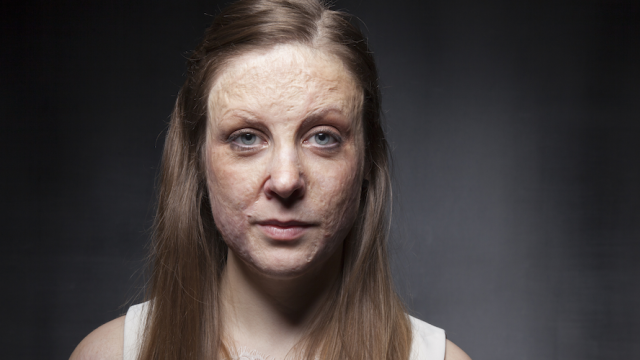What Does it Mean When Someone Stares At Your Burn Scars?
 Written by Dr. Lise Deguire on October 31, 2022
Written by Dr. Lise Deguire on October 31, 2022
It happens to all of us. It’s a blazing summer afternoon. You put on your bathing suit, exposing your scars, and walk out toward the inviting blue pool. You might feel self-conscious, but you want to enjoy the lovely day. You hold your head high. Out of the corner of your eye, someone stares at you. Possibly, that person is a preschooler, mouth agape. But adults stare too, especially when they think you aren’t looking. In an instant, your mood plummets from happy to glum.
Why Do People Stare At Burn Scars?
When people stare, our mind often makes toxic interpretations about staring. We automatically assume we know what that person is thinking. Frequently, we project our own doubts and fears onto that person. “He thinks I’m ugly,” or worse, “See, I am ugly,” or even worse, “I should never have come because I am so ugly.”
But why do people stare? Does their staring really have anything to do with us? People stare at anything which looks unexpectedly different. When a face is not expected, through scarring or lack of symmetry, it is human nature to scan that face longer, seeking understanding of what happened to the person. This stare feels awful to us. But truly, perhaps the person is judging us, and perhaps … they aren’t. In other words, everyone naturally looks longer at any face that isn’t what they expected.
Infrequency complicates the situation. About 1 in 100 people have any sort of facial disfigurement. Most people have never met a burned person. In contrast, 11.6% of Americans use wheelchairs. People are accustomed to seeing others in wheelchairs, so we aren’t surprised when we encounter them. However, burned people are more unusual, and people simply do not expect us.
Socialization is also a factor. Most of us are taught by our parents that staring is rude. Adults usually know that they shouldn’t stare, and they inhibit themselves from doing so. However, little children have not yet learned this lesson and often stare unabashedly. Additionally, there are adults who stare, perhaps because they have their own intellectual/emotional/social challenges.
Finally, when people stare at us, they might be wondering what we are like. Given that many people have never seen a burned person before, the only experience they may have with burns is through movie or TV characters. Unfortunately, movies and TV shows frequently depict scarred people as villains (Scar in the Lion King, Darth Vader, Voldemort for example). Those evil fictional characters may be the only burned faces a person has ever seen, until they meet you.
So, when you are stared at, it usually means that someone didn’t expect to see your different-looking face or body, and that they also haven’t learned that it is rude to stare.
How To Handle Staring
We can’t control being stared at, but we have choices in handling this challenge. First, we have control over how we interpret these stares. Instead of assuming the worst --“they think I’m ugly”—make your interpretation more positive-- “They didn’t expect my scars,” or “They have never seen scars before.” These new thoughts would be both more accurate and more beneficial.
Second, we can interact positively with the starer. When someone stares at me, I make eye contact and smile at them. My eye contact silently reminds the starer that I am a person, just like them, and that I notice them looking at me. My smile also signals to the starer that I am a friendly person (not Darth Vader!) and they should stop staring.
Every time we hold our heads high and interact with the public with polite friendliness, we give people a positive interaction with our burned community. Most people stare because they have never seen someone who looks like us. Let them walk away from this interaction learning what we know: our community is kind, warm, and resilient, and burned people are people, just like them.
Connect With Other Survivors
Virtual Support Group can help you find ways to handle staring and learn how other burn survivors address similar situations.
Hosted on the 2nd and 4th Monday at 8 pm EST of every month!


